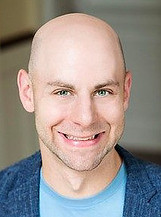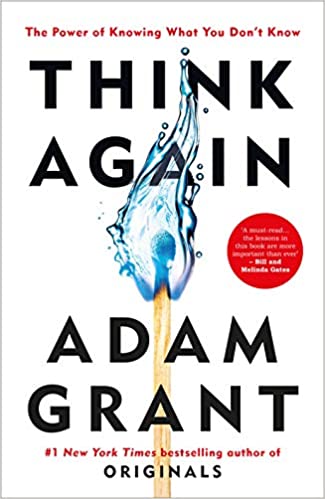Book – Think Again (The power of knowing what you don’t know) (Summary)
Author – Adam Grant
Genre – Self -Help Book
Published in – 2021
We have no problem rethinking and changing our wardrobe and kitchen interiors occasionally; however, When it comes to our knowledge and opinions, we tend to stick to our guns.
We laugh at people who still use Windows 95, yet we still cling to opinions we formed in 1995.
Think Again encourages questioning assumptions, habits, and instincts that we hold dear and never ask, even if they don’t serve us any longer.

About the Book –
Think Again is an invitation to let go of knowledge and opinions that no longer serve you well and to anchor your sense of self in Flexibility rather than Consistency. It can help you generate new solutions to old problems and revisit senior solutions to new situations.
Adam hopes with this book; readers will explore how rethinking happens by providing compelling evidence and mentioning a few of the most skilled rethinkers.
The book is divided into three sections –
The First Section focuses on opening our minds to rethinking our ideas (Individual Rethinking).
The Second Section examines how we can encourage others to think again (Interpersonal Rethinking).
The Third Section is about creating a community of lifelong learners (Collective Rethinking).
Part I – Individual Rethinking – Updating Our Views
Most of us take pride in our knowledge and expertise and stay true to our beliefs and opinions. The problem is that we live in a rapidly changing world where we must spend as much time rethinking as we think.
We’re swift to recognize when other people need to think again. Unfortunately, when it comes to our knowledge and opinions, we often favor feeling right over being right.
1) Preachers, Prosecutors, and Politicians –
- As we think and talk, we often slip into the mindsets of three professions: preachers, prosecutors, and politicians. We take on a particular identity in each mode and use a distinct set of tools.
- We go into preacher mode when our sacred beliefs are in jeopardy: we deliver sermons to protect and promote our ideals. We enter prosecutor mode when we recognize flaws in other people’s reasoning: we marshal arguments to prove them wrong and win our case.
- We shift into politician mode when we’re seeking to win over an audience: we campaign and lobby for the approval of our constituents.
2) Scientist Mode –
- Adam suggests being in scientist mode when it comes to individual thinking – Scientists are expected to doubt what they know, be curious about what they don’t know, and update their views based on new data.
- Thinking like a scientist involves more than just reacting with an open mind. It means being actively open-minded. It requires searching for reasons we might be wrong, not for reasons we must be right—and revising our views based on what we learn.
- Scientific thinking favors humility over pride, doubt over certainty, and curiosity over closure.
3) Don’t Stop Unbelieving –
- Recognizing our shortcomings opens the door to doubt. As we question our current understanding, we become curious about what information we’re missing, which maintains our humility by reinforcing how much we still have to learn.
- The curse of knowledge is that it closes our minds to what we don’t know. Good judgment depends on having the skill—and the will—to open our minds.
4) The Ignorance of Arrogance –
- Adam explains that people are often overconfident about their know-how of many things, which is called the Dunning-Kruger effect; when we lack competence, we’re most likely to be brimming with overconfidence. They found that in many situations, those who can’t don’t know they can’t.
- Humility is often misunderstood. It’s not a matter of having low self-confidence. One of the Latin roots of humility means “from the earth.” It’s about being grounded—recognizing that we’re flawed and fallible.
5) Confident Humility –
- We need to attain confident humility: having faith in our capability while appreciating that we may not have the right solution or even be addressing the right problem. That gives us enough doubt to reexamine our old knowledge and enough confidence to pursue new insights.
- Confident humility doesn’t just open our minds to rethinking—it improves the quality of our rethinking.
6) Benefits of Doubt –
- Plenty of evidence suggests that confidence is just as often the result of progress as the cause of it. We don’t have to wait for our confidence to rise to achieve challenging goals. We can build it by achieving challenging goals.
- Experts best seek knowledge, but creativity and wisdom can come from anywhere.
- Arrogance leaves us blind to our weaknesses. Humility is a reflective lens: it helps us see them. Confident humility is a corrective lens: it enables us to overcome those weaknesses.
7) The Joy of Being Wrong –
- Being wrong isn’t always a bad thing. It can be a sign that we’ve learned something new—and that discovery can be a delight.
- Adams claims that we are often open, intrigued, and willing to learn when we are wrong about things that don’t matter much to us.
- However, when a core belief is questioned, we tend to shut down rather than open up. It’s as if a miniature dictator is living inside our heads.
- To unlock the joy of being wrong, we need to detach. I’ve learned that two kinds of detachment are beneficial: detaching your present from your past and detaching your opinions from your identity.
Part II – Interpersonal Rethinking – Opening Other People’s Mind
When arguing with others, we often take an adversarial approach. Instead of opening their minds, we effectively shut them down or riled them.
They play defense by putting up a shield, play offense by preaching their perspectives and prosecuting ours, or play politics by telling us what we want to hear without changing what they think.
1) The Debate is Like a Dance –
- A good debate is not a war. It’s not a tug-of-war; you can drag your opponent to your side if you pull hard enough on the rope. It’s more like a dance that hasn’t been choreographed and negotiated with a partner who has a different set of steps in mind.
- Adam explained well how a skilled negotiator differs from an amateur one. They find common grounds, ask more questions, provide lesser yet solid arguments, and do their best to let the opponent keep an open mind to think about the merit of both side’s arguments.
2) Building Stereotypes –
- Adam explains how we form beliefs, build stereotypes in our minds, and go to heights justifying or defending them, diminishing the rival’s opinions.
- Our beliefs are like pairs of reality goggles. We use them to make sense of the world and navigate our surroundings. A threat to our opinions cracks our goggles, leaving our vision blurred.
- We become incredibly hostile when trying to defend opinions that we know, deep down, are false. This is where individual rethinking in scientist mode can help.
3) Motivational Interviewing –
- The central premise is that we can rarely motivate someone else to change. We’re better off helping them find their motivation to change.
- The goal isn’t to tell people what to do; it’s to help them break out of overconfidence cycles and see new possibilities. Our role is to hold up a mirror so they can see themselves more clearly and then empower them to examine their beliefs and behaviors.
- Three things to remember for Mastering Motivational Interviewing – 1) Ask Open-ended questions, 2) Engage in Reflective Listening, and 3) Affirm a person’s desire and ability to change.
Part III – Collective Rethinking
A dose of complexity can disrupt overconfidence cycles and spur rethinking processes. It gives us more humility about our knowledge and more doubts about our opinions, and it can make us curious enough to discover the information we lack.
1) Rewriting the Text Book –
- Ultimately, education is more than the information we accumulate in our heads. It’s the habits we develop as we revise our drafts and the skills we build to keep learning.
- Collecting a teacher’s knowledge may help us solve the day’s challenges, but understanding how a teacher thinks can help us navigate the challenges of a lifetime.
2) Learning, Interrupted –
Think like fact-checkers: the guidelines include (1) Interrogate information instead of simply consuming it. (2) Reject rank and popularity as a proxy for reliability, and (3) Understand that the sender of information is often not its source.
3) Judging Yourself v/s Judging Your Work –
- We become more open to exploring different possibilities when we see work as what we do rather than who we are.
- Looking for meaning in our work rather than joy can help us accomplish lasting happiness, then the other way around.
- Some people become active architects of their jobs. They rethink their roles through job crafting— changing their daily actions to better fit their values, interests, and skills in their present position.
I have also created a video of a few quotes from the book – I hope you like it. Please subscribe to my YouTube Channel, Myread4change.
Conclusion –
After rereading Think, you will be inspired to rethink your assumptions, habits, and beliefs, become less sure of your opinion, and be curious to learn a new perspective. As we learn more and more, we realize how little we know.
If you like this book, you will also like The Subtle Art of Not Giving a F*ck.
I hope this book summary helped you in some way. Please share your thoughts in the comments. I would love to hear from you.
Thank you for Reading.
Muzammil


This is one awesome blog. Really Great.